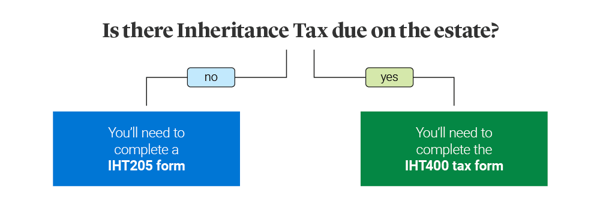What are the duties of the executor of a will?
Being named as an executor in a will is an important responsibility, and means you’ll have earnt the trust of the person making the will. But what do the responsibilities of an executor entail, who can be named as an executor, and can you renounce an executorship? Find out more in our guide.

You may also be interested in...
An executor is someone named in a will who is legally responsible for handling the deceased's estate. The estate encompasses the deceased person's belongings, finances, property, and possessions. Before you can act as an executor, you may need to obtain legal permission, known as a Grant of Probate.
You may be referred to as an 'administrator', rather than executor, if there is no will, or if those named are unwilling or unable to fulfil the executor role. In these cases, a court would appoint you as an administrator.
In terms of responsibilities, executors must manage the deceased’s assets during the ‘administration period’. This refers to the timeframe starting from the date of death until the moment the assets have been passed onto the beneficiaries.
The specific responsibilities of an executor include paying any debts owed by the deceased, selling assets such as properties, and paying any tax due, as well as reporting the estate value to HMRC.
An administrator is an individual (or professional body) who takes on the responsibility of the deceased’s estate. This could be because there is no will, or the named executors aren’t willing to act.
An administrator must apply for Letters of Administration before they can deal with an estate. This can be done by completing a PA1A along with the death certificate. Additionally, proof of all of the assets owned will be needed, as well as details of any debts.
Most people choose immediate family members as their executors, with spouses, civil partners and children being most commonly appointed.
Anyone over 18 can be an executor, and there’s no rule against people who are among the beneficiaries of your will also being your executor – though it’s worth remembering that an executor can’t be one of the official witnesses to your will.
It can be helpful to appoint an executor with professional, specialist knowledge. It’s worth bearing in mind that, in England and Wales, the executor can be personally (and financially) liable for any mistakes made. Some people appoint a solicitor as an executor for this reason. A solicitor will either charge a fixed fee, an hourly rate or a percentage of the estate. In any case, their cost should be borne by the estate.
If there is no valid will, or the executors have renounced (resigned) nominators, then the next-of-kin can apply to be an administrator in the following order of priority:
- The widow of the deceased (the married partner or civil partner of the person who has died).
- The children or adopted children of the deceased.
- The child of the person who has died.
- The grandchild of the person who has died.
The following people are unable to apply for Letters of Administration:
- The partner, if they weren’t a spouse or civil partner at the time of the deceased’s death.
- Stepchildren.
Yes, it’s possible to appoint a professional executor of a will, such as solicitors, accountants or banks. This is an alternative to appointing family members or friends.
Some people choose to appoint a solicitor as an executor because they want professional, specialist knowledge. In England and Wales, the executor can be personally (and financially) liable for any mistakes made. Some people appoint a solicitor as an executor for this reason.
A solicitor will either charge a fixed fee, an hourly rate or a percentage of the estate. In any case, their cost should be borne by the estate.
Pros and cons of appointing a professional executor
Is it worth getting an external executor for a will? Here are some advantages and disadvantages.
Pros
Cons

It may be difficult for you to pay an Inheritance Tax bill before being granted probate, as you won’t be able to access any money in the deceased’s estate until probate is granted. In a case like this, you should check to see whether the deceased had a life insurance policy in trust, as this would pay out even without probate. Alternatively, you could talk to the deceased’s bank, as sometimes they will agree to release an amount direct to HMRC for Inheritance Tax without probate.
Renunciation as executor of a will
In England and Wales, a named executor can resign the role at any time by signing a document called a Deed of Renunciation or a Letter of Renunciation. There are many reasons why someone might wish to renounce their executor responsibilities, from ill health to a lack of spare time.
It’s better to renounce an executorship sooner rather than later, as legal complications can arise once the estate administration has started. There are different laws across the UK if you wish to change the executor of a will – see Citizens Advice Scotland or NI Direct for more information.
If someone resigns as an executor, an alternative person will need to take their place if there is no executor left, otherwise the courts will need to appoint an administrator. If there are still executors in place, they can apply for probate, provided the will doesn’t request a certain number of executors as a pre-condition. You can still be a beneficiary of a will even if you’ve renounced your executorship.
Yes, if you’re a named executor but you’d rather someone else dealt with the will, you can appoint an attorney using form PA11 available on GOV.UK. Read more about applying for Power of Attorney.
How to remove an executor of a will
If someone is refusing to carry out their obligations as the executor of a will, you should firstly try and resolve the situation amicably, and if necessary, write them a letter to explain that an application will be made to the court if they refuse to apply for a grant of probate. In some situations, you can serve them a formal notice from the Probate Registry known as a citation, which instructs the executor to apply for probate or renounce their executorship.
If you have serious concerns that an executor is not fulfilling their duties in accordance with the will, you can make an application to the courts, who have the power to remove an executor in limited circumstances; for example, if they’re stealing from the estate or failing to keep accurate records.
If someone has died without a will in place, that person’s money and assets will be distributed according to a legal default known as intestacy. Read more about what happens if you die without a will.
Our Over 50s Fixed Life Insurance
Our Over 50s Fixed Life Insurance could allow you to leave a fixed cash sum to your loved ones when you pass away. This could be used to help contribute towards your funeral costs or be left as a gift. If you are planning to leave the cash sum to help contribute towards funeral costs, you can choose to add the Funeral Benefit Option to your plan if you apply by phone. T&Cs apply.






